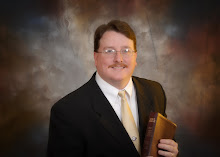During a Church service the other night, my oldest daughter passed a small slip of paper to me. It's always a pleasure to get these little creative gifts from my children, knowing that they did it out of love and a desire to hear what I think of their work. This note especially struck me when I looked at it. On one side of the note was a handwritten passage of Scripture from Psalm 2, which said, "Then He shall speak to them in His wrath, and distress them in His deep displeasure: 'Yet I have set My King on My holy hill of Zion.'" (Psalm 2:5-6, NKJV) On the other side of the note, my daughter had drawn a hill with three crosses at the top and an open tomb at the bottom.
Now when I saw that, I had to say, "Wow!" Then when I got the chance to ask her about it later, I asked her if she had specially picked that verse to go with that picture. To my surprise, she had simply picked a verse at random and then had drawn the picture that she had wanted to draw regardless of the verse she picked. Despite the fact that the verse and the drawing were placed together for no other reason than that they were put on opposite sides of the same slip of paper, there is no mistaking the symbolism and deeper meaning of it all.
The context of these verses in Psalm 2 really sets the stage for that little slip of paper. The writer begins in verse 1 by asking, "Why do the nations rage, and the people plot a vain thing?" He then goes on to explain what this "vain thing," or "useless deed," is, saying, "The kings of the earth set themselves, and the rulers take counsel together, against the LORD and against His Anointed, saying, 'Let us break Their bonds in pieces and cast away Their cords from us.'" (Psalm 2:1-3, NKJV) This "Anointed" one is God's Messiah, the one whom He has chosen to be King of Kings and Lord of Lords. The entire Old Testament looks forward to the arrival of this Messiah, while the entire New Testament proclaims when He actually arrived and what He did for lost humanity. The Old Testament records man's repeated attempts to "cast away" God's rule, while the New Testament promises how God's rule will be permanently restored through His Messiah. The Old Testament does not give the Messiah's name, but the New Testament says that His name is "Jesus," literally meaning "salvation" and "deliverance!" Those of us who have believed in Him by faith, bow the knee to Him as our King, namely our Lord Jesus Christ! But ever since the first knees began to bow before him, human government and religion has taken a stand against the King that God has set on His "holy hill of Zion," from Roman emperors to Communist regimes.
Regardless of all resistance to His rule and rejection of His ruler, God has set His "King" on "His holy hill of Zion!" Zion is a Biblical name for Jerusalem, which is often called "the Holy City of the Holy Lands" to this day. Many people of many different religions call it such for many different reasons, many of which have been devised by man's own imagination. But the question remains concerning why God would call Jerusalem His "holy hill." Well, it's all about the "King" whom He has "set" there!
It began with what is depicted in the picture that my daughter drew for me. As the King of Kings and Lord of Lords, Jesus came to Zion's hill the first time to be crucified, giving His life to save ours. Though man led the trial against Him, carried out humiliating torture against Him, and finally executed Him, it was God who set His "King" on His "holy hill of Zion!" The cross was God's plan to save us from our sin of rebellion against Him! The King did not come to kill us all, but to save all of us who choose to believe in Him! When Abraham stood on that same "hill," which was once known as Mount Moriah, his own son was spared a sacrificial death by God providing a ram to die in his place. At that moment, God gave Abraham a glimpse of what would one day happen for all of us on that "hill" and that is why the Bible says, "...Abraham called the name of the place, The-LORD-Will-Provide; as it is said to this day, 'In the Mount of the LORD it shall be provided!'" (Genesis 22:14, NKJV)
Some have said and still say that Jesus was just another religious martyr dying a horrible death and that His death did nothing to save anyone from anything. If Jesus had simply died there, with no resurrection to follow, then I would agree with them. Without the resurrection, Jesus could not have been any more than an uncommon man dying a common criminal's death, nor could He have been the "King" that God "set" on His "holy hill of Zion." That is one of the reasons that the resurrection had to occur, in order to prove that Jesus really is that same King of Kings and Lord of Lords! That's why my daughters picture is a wonderful symbol of how God completely set His "King" on His "holy hill of Zion," because she didn't simply draw a cross, she drew an empty tomb. The Bible says, "Let this mind be in you which was also in Christ Jesus, who, being in the form of God, did not consider it robbery to be equal with God, but made Himself of no reputation, taking the form of a bondservant, and coming in the likeness of men. And being found in appearance as a man, He humbled Himself and became obedient to the point of death, even the death of the cross." (Philippians 2:5-8, NKJV) If the story ended there, it would be hard to picture Him as the promised "King," but that was not at all the end of His story! In the same passage, the Bible goes on to say, "Therefore God also has highly exalted Him and given Him the name which is above every name, that at the name of Jesus every knee should bow, of those in heaven, and of those on earth, and of those under the earth, and that every tongue should confess that Jesus Christ is Lord, to the glory of God the Father." (Philippians 2:9-11, NKJV)
The thought that Jesus will one day be honored by all, for who He really is, draws us back to Psalm 2 and the warning issued there. One day, all those who have rejected His rule and stood against Him will experience the consequences of their mistake. The Bible says, "Then He shall speak to them in His wrath, and distress them in His deep displeasure..." (Psalm 2:5, NKJV). One day soon, the Lord Jesus Christ will return to His "holy hill of Zion," to rule and to reign on the earth, as the King has declared, saying, "The LORD has said to Me, 'You are My Son, today I have begotten You. Ask of Me, and I will give You the nations for Your inheritance, and the ends of the earth for Your possesion. You shall break them with a rod of iron; You shall dash them to pieces like a potter's vessel.'" (Psalm 2:7-9, NKJV) The day is coming when, regardless of whether or not you still live on Earth, whether or not you have gone to Heaven as one of His own, or whether or not you have gone to Hell as one of those who rejected Him, you will submit to His rule by bowing the knee and confessing that Jesus Christ really is Lord!
That is why the writer of Psalm 2 gives wise advice to us all when he says, "Now therefore, be wise, O kings; be instructed, you judges of the earth. Serve the LORD with fear, and rejoice with trembling. Kiss the Son, lest He be angry, and you perish in the way, when His wrath is kindled but a little. Blessed are all those who put their trust in Him." (Psalm 2:10-12, NKJV) Putting your "trust" in Him, is to simply have faith in the One who loves you and has given all on that "holy hill of Zion" for you to be saved! Faith in Him changes everything!
"Lord Jesus, thank-you for helping me to see you as that King of Kings and Lord of Lords. Thank-you for what you suffered on that hill so long ago on my behalf. May the day come soon when you will return to that hill in the glory that you deserve! Amen."
Tuesday, September 05, 2006
Subscribe to:
Posts (Atom)


